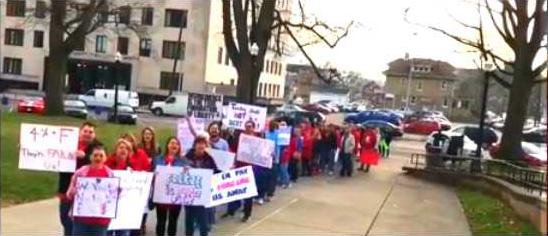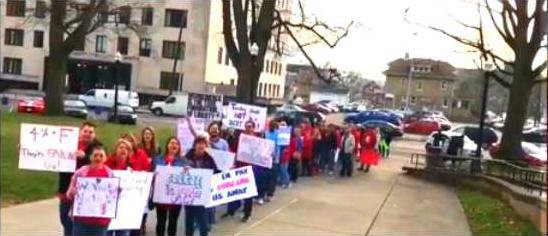West Virginia wont see its teacher strike end on Tuesday.
According to CNN, nearly 20,000 teachers and 13,000 school service employees didnt head into work again this week, which led schools across 55 counties to close their doors.
Tuesday was the fourth day in the ongoing work stoppage, in which teachers and school employees are demanding better pay and benefits.
Christine Campbell, president of the American Federation of Teachers-West Virginia, which represents teachers and staff, said teachers are ready to head back to the classroom once a deal can be reached.
"We are ready, we are willing. We stand on the right side of public education, by being back here and outside our schools tomorrow," Campbell said.
Teachers and staff are hoping for salary increases, a better health care package and better legislation that will stop attacks on seniority, according to NPR.
Right now, West Virginia ranks 48th in the nation for average teacher pay, according to the National Education Association.
It still remains unclear if a solution will arise. Gov. Jim Justice pledged to offer teachers 2 percent raises next year and 1 percent for the following years. However, the teachers said this isnt enough of an increase, USA Today reported.
Legislation has remained in a freeze, however, as the legislative session is coming to a close.
Lawmakers, such as Senate President Mitch Carmichael and Attorney General Patrick Morrisey, said the work stoppage is illegal. According to Vox, it is illegal for teachers to strike in West Virginia. Thats why some schools said they were closed for staff development or the weather.
"This is, in large measure, a county issue. They must decide whether they are going to declare this an illegal strike as that is clear from law that it is or if they're going to just close school for another day on other grounds," Carmichael told reporters on Monday, according to NPR. "So, to the extent that the counties have flexibility in how they manage their school system, the ball is in their court. So, we'll see how each county (proceeds.) We certainly don't want to tell them what to do. We're not doing that by any means."
However, House Speaker Tim Armstead offered a more measured response, saying he hopes the state and teachers can work out a deal.
"We in the House have heard loudly and clearly the message of our teachers, service personnel and state employees, Armstead said Friday in a written statement, and I don't believe it's necessary to continue this strike and keep our kids out of the classroom to draw attention to these issues.
In the meantime, state food banks are helping students who depend on school meals to eat. Child care centers have also been set up to help those children, according to local news reports. Teachers have also handed out free lunches to students.
"Before they made the decision to strike they wanted to make sure their students' needs were taken care of," Jennifer Wood, with the American Federation of Teachers union in West Virginia, told WSMV-TV.
According to CNN, nearly 20,000 teachers and 13,000 school service employees didnt head into work again this week, which led schools across 55 counties to close their doors.
Tuesday was the fourth day in the ongoing work stoppage, in which teachers and school employees are demanding better pay and benefits.
Christine Campbell, president of the American Federation of Teachers-West Virginia, which represents teachers and staff, said teachers are ready to head back to the classroom once a deal can be reached.
"We are ready, we are willing. We stand on the right side of public education, by being back here and outside our schools tomorrow," Campbell said.
Teachers and staff are hoping for salary increases, a better health care package and better legislation that will stop attacks on seniority, according to NPR.
Right now, West Virginia ranks 48th in the nation for average teacher pay, according to the National Education Association.
It still remains unclear if a solution will arise. Gov. Jim Justice pledged to offer teachers 2 percent raises next year and 1 percent for the following years. However, the teachers said this isnt enough of an increase, USA Today reported.
Legislation has remained in a freeze, however, as the legislative session is coming to a close.
Lawmakers, such as Senate President Mitch Carmichael and Attorney General Patrick Morrisey, said the work stoppage is illegal. According to Vox, it is illegal for teachers to strike in West Virginia. Thats why some schools said they were closed for staff development or the weather.
"This is, in large measure, a county issue. They must decide whether they are going to declare this an illegal strike as that is clear from law that it is or if they're going to just close school for another day on other grounds," Carmichael told reporters on Monday, according to NPR. "So, to the extent that the counties have flexibility in how they manage their school system, the ball is in their court. So, we'll see how each county (proceeds.) We certainly don't want to tell them what to do. We're not doing that by any means."
However, House Speaker Tim Armstead offered a more measured response, saying he hopes the state and teachers can work out a deal.
"We in the House have heard loudly and clearly the message of our teachers, service personnel and state employees, Armstead said Friday in a written statement, and I don't believe it's necessary to continue this strike and keep our kids out of the classroom to draw attention to these issues.
In the meantime, state food banks are helping students who depend on school meals to eat. Child care centers have also been set up to help those children, according to local news reports. Teachers have also handed out free lunches to students.
"Before they made the decision to strike they wanted to make sure their students' needs were taken care of," Jennifer Wood, with the American Federation of Teachers union in West Virginia, told WSMV-TV.








